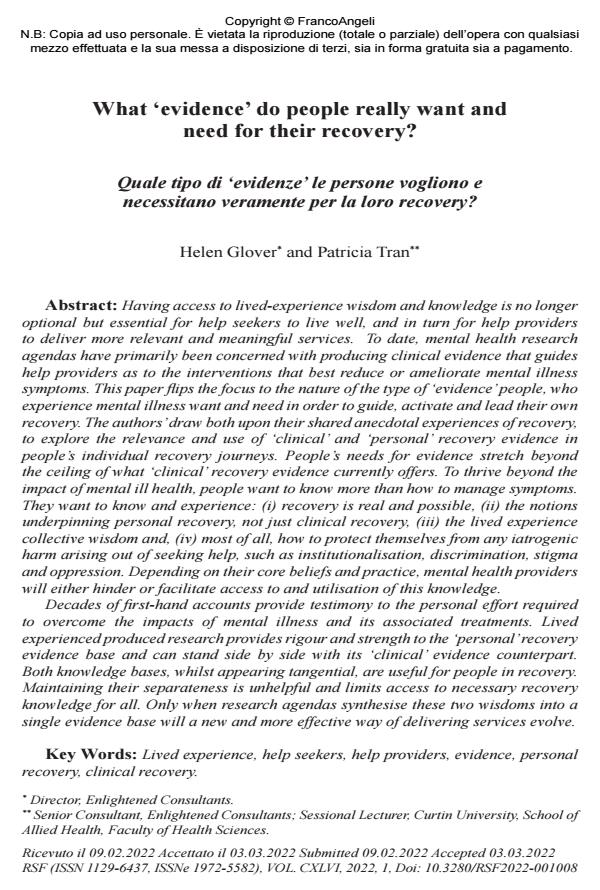What ‘evidence’ do people really want and need for their recovery?
Journal title RIVISTA SPERIMENTALE DI FRENIATRIA
Author/s Helen Glover, Patricia Tran
Publishing Year 2022 Issue 2022/1
Language English Pages 17 P. 135-151 File size 246 KB
DOI 10.3280/RSF2022-001008
DOI is like a bar code for intellectual property: to have more infomation
click here
Below, you can see the article first page
If you want to buy this article in PDF format, you can do it, following the instructions to buy download credits

FrancoAngeli is member of Publishers International Linking Association, Inc (PILA), a not-for-profit association which run the CrossRef service enabling links to and from online scholarly content.
Having access to lived-experience wisdom and knowledge is no longer optional but essential for help seekers to live well, and in turn for help providers to deliver more relevant and meaningful services. To date, mental health research agendas have primarily been concerned with producing clinical evidence that guides help providers as to the interventions that best reduce or ameliorate mental illness symptoms. This paper flips the focus to the nature of the type of ‘evidence’ people, who experience mental illness want and need in order to guide, activate and lead their own recovery. The authors’ draw both upon their shared anecdotal experiences of recovery, to explore the relevance and use of ‘clinical’ and ‘personal’ recovery evidence in people’s individual recovery journeys. People’s needs for evidence stretch beyond the ceiling of what ‘clinical’ recovery evidence currently offers. To thrive beyond the impact of mental ill health, people want to know more than how to manage symptoms. They want to know and experience: (i) recovery is real and possible, (ii) the notions underpinning personal recovery, not just clinical recovery, (iii) the lived experience collective wisdom and, (iv) most of all, how to protect themselves from any iatrogenic harm arising out of seeking help, such as institutionalisation, discrimination, stigma and oppression. Depending on their core beliefs and practice, mental health providers will either hinder or facilitate access to and utilisation of this knowledge. Decades of first-hand accounts provide testimony to the personal effort required to overcome the impacts of mental illness and its associated treatments. Lived experienced produced research provides rigour and strength to the ‘personal’ recovery evidence base and can stand side by side with its ‘clinical’ evidence counterpart. Both knowledge bases, whilst appearing tangential, are useful for people in recovery. Maintaining their separateness is unhelpful and limits access to necessary recovery knowledge for all. Only when research agendas synthesise these two wisdoms into a single evidence base will a new and more effective way of delivering services evolve.
Keywords: Lived experience, help seekers, help providers, evidence, personal recovery, clinical recovery
Helen Glover, Patricia Tran, What ‘evidence’ do people really want and need for their recovery? in "RIVISTA SPERIMENTALE DI FRENIATRIA" 1/2022, pp 135-151, DOI: 10.3280/RSF2022-001008